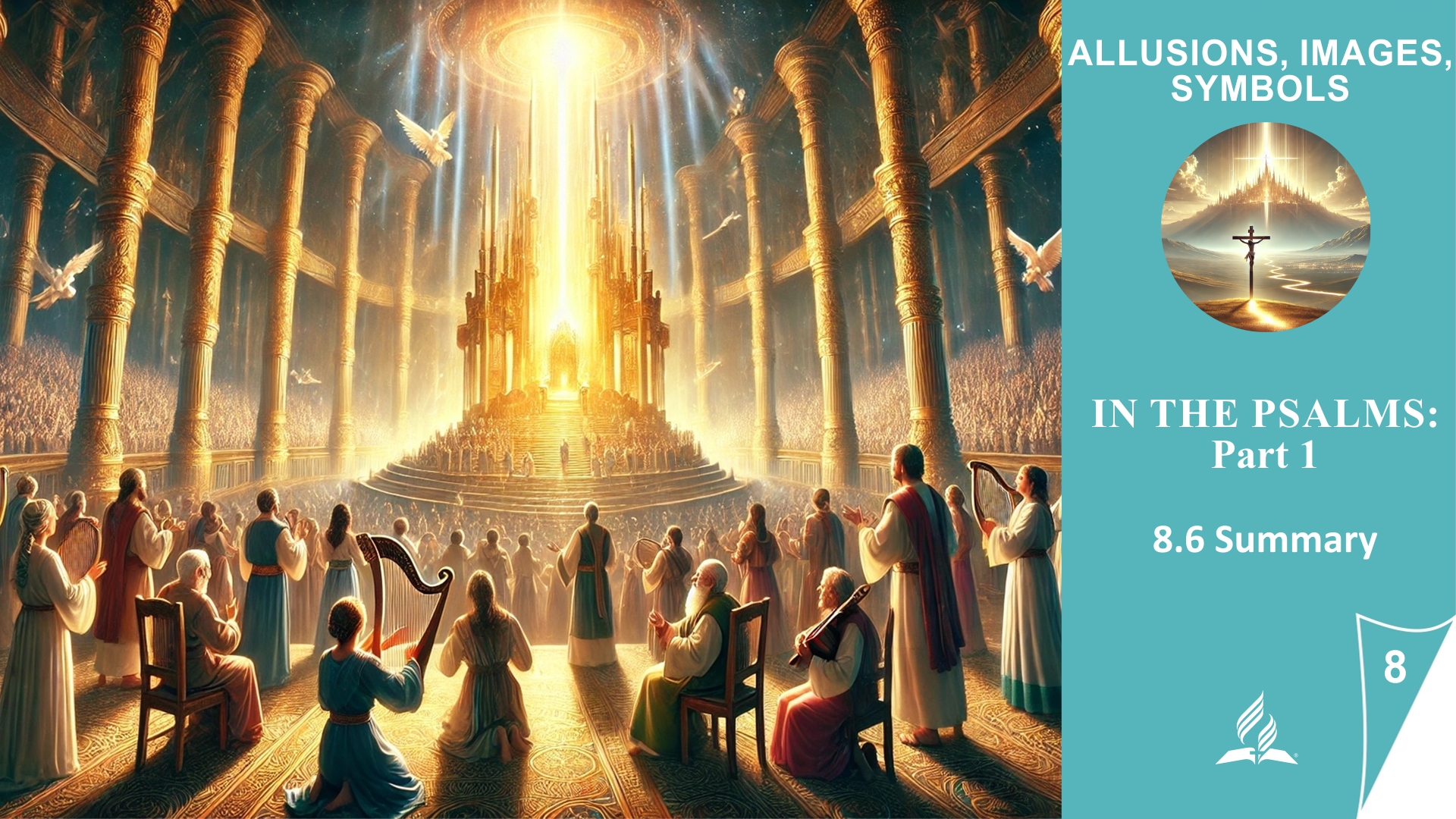Lesson 8.In the Psalms: Part 1 | 8.6 Summary | ALLUSIONS, IMAGES, SYMBOLS | LIVING FAITH



📘 Lesson 8.In the Psalms: Part 1
8.6 Summary
In the Light of the Sanctuary – The Psalms as Guides to God’s Presence
…………………………………………………………………
🕊️📜 Introduction
The Psalms are more than songs. They are prayers, laments, hymns of praise—and often prophetic windows into God’s great plan of redemption. In Lesson 8 – In the Psalms, Part 1, we embark on a spiritual journey through five key themes that draw us deep into questions like: Who is Jesus for us today? How does His grace work? What does it mean to live righteously? And how does forgiveness turn into mission?
This lesson invites us not only to worship God but to know Him in our innermost being—as our High Priest, our King on Zion, our Law-giver in the heart, our Judge in mercy, and our Commission-giver in the world.
………………………………………………………………….
📖 Bible Study
8.1 Our High Priest (Psalm 110)
Psalm 110 presents Christ as priest forever in the order of Melchizedek. He sits at God’s right hand—a picture of power and of mediation. Jesus is not only King but our Advocate. He rules not from a distance but in love—with pierced hands interceding for us each day.
8.2 On Mount Zion (Psalm 2 & Revelation 14)
Mount Zion symbolizes God’s kingship. The powers of the world rebel, but God has enthroned His King. In Revelation 14, the redeemed stand with the Lamb on Zion—people who bear God’s name on their foreheads, purified and faithful. Zion is not just a place but the community of those redeemed and following the Lamb.
8.3 The Law in Our Hearts (Psalm 119 & Exodus 34)
God’s law is not merely a moral code. It expresses His character—His righteousness, love, and faithfulness. When the law is written on our hearts, our lives are transformed. God desires not just obedience but relationship. The end-time remnant are faithful because they love, not because they fear.
8.4 Psalm 5 – The Language of Judgment
David recognizes that the wicked cannot endure God’s presence, but the righteous may enter by grace. God is holy. And because He is holy, there is judgment. But because He is gracious, we may stand—through the Lamb. Revelation 14 shows the same contrast: the world is tested, yet those who follow Christ stand—not by their own strength but because they are redeemed.
8.5 Teaching Transgressors Your Ways (Psalm 51)
David had sinned deeply. Yet after cleansing he pledges:
“I will teach transgressors your ways.”
Redemption does not silence us; it sends us as messengers of grace. In Revelation 14, everything begins with the “eternal gospel.” Before judgment, before Babylon falls, before warning—there is always the good news.
………………………………………………………………….
✨ Spiritual Principles
-
Jesus is our High Priest—daily interceding for us.
-
Zion is not geographical but the fellowship of the redeemed.
-
God’s law in the heart leads to joyful obedience, not religious duty.
-
Judgment brings accountability—but in Christ also hope.
-
Those redeemed become ambassadors of grace.
………………………………………………………………….
🧩 Daily Application
-
Pray with the Psalms. They bring your feelings, doubts, praise, and hope before God—honestly and deeply.
-
Recognize your calling. If you have known forgiveness, you also carry the mission to tell others.
-
Trust Christ in the judgment. When fear comes, remember: He is your High Priest.
-
Live as a witness. People don’t listen to perfect Christians but to honestly redeemed ones.
………………………………………………………………….
✅ Conclusion
The Psalms teach us not just theology but relationship.
God is righteous, yes—but also gracious. He is King—but also near.
When He enters our hearts, He transforms us: from guilty to witnesses. From sufferers to messengers. From pray-ers to proclaimers.
………………………………………………………………….
💭 Thought of the Day
Those who see themselves forgiven will call others to grace. Those touched by the Lamb will sing the song of the redeemed—on Zion, even today.
………………………………………………………………….
🕯️📘 Illustration – The Sound of Grace: A Journey through Guilt, Redemption, and Commission
It was an ordinary Monday night in Munich when Lina Köhler sat alone in her studio, headphones on, eyes closed, fingers hovering over her keyboard. The air smelled of cold coffee and creative fatigue. A red light flickered on her recorder—waiting.
Lina, 34, was a musician, producer—and above all: a seeker. Her songs were heard on TV series, ads, streaming platforms. Yet something was missing: depth, truth, soul.
She’d grown up in a Christian home—mealtime prayers, Sunday services, Advent readings. Yet by sixteen she had mentally checked out. Too much morality, not enough authenticity, she thought. For years God had been a distant idea.
Then things began to change—slowly, quietly.
✝ ✝ ✝ ✝ ✝ ✝ ✝
It started with a letter.
Her brother Daniel sent it. Handwritten. No text, no link—just ink on paper. “I know why you’ve pulled away,” he wrote. “But I think you’ll soon hear a voice you’ve long ignored. Don’t run when it comes.”
Lina frowned. She unfolded a Psalm 51 bookmark he’d enclosed. “Create in me a clean heart,” it read. “I will teach transgressors your ways.”
Skeptical yet moved, she began to read—one Psalm a day. Sometimes she cried, sometimes she raged, but always she drew nearer to God.
✝ ✝ ✝ ✝ ✝ ✝ ✝
One pivotal night she returned to the studio. Alone. And felt, not a vision but an inner clarity:
You’re not just an artist. You’re called.
She whispered, “To what?”
And the answer formed in her heart, Psalm-like:
“To teach transgressors your ways—by what I’ve learned, by what I’ve been forgiven.”
✝ ✝ ✝ ✝ ✝ ✝ ✝
The next morning she called Daniel:
“I want to know more,” she said.
They met weekly, reading Psalms 2, 5, 110, 119. The words became bread for her soul. She realized:
-
Psalm 110: Jesus is not only King—He is my High Priest interceding for me.
-
Psalm 5: I cannot stand before God—but by grace I may enter.
-
Psalm 119: His law is not a burden but a song that reshapes my heart.
-
Psalm 51: I was lost—but now I am sent to show others the way.
She laughed through tears: “God used the Psalms to call me back. I thought they were outdated poetry, but they were my mirror.”
✝ ✝ ✝ ✝ ✝ ✝ ✝
Then came Zion—not the mountain, but the vision.
Reading Revelation 14’s picture of the Lamb on Mount Zion—redeemed, pure, faithful—struck her like an arrow:
“They follow the Lamb wherever He goes.”
“In their mouth was found no deceit.”
“They bear God’s name on their foreheads.”
She knew: this was her calling. Not to be perfect but to be redeemed—and not to keep it to herself.
✝ ✝ ✝ ✝ ✝ ✝ ✝
Her first fruit was a song titled Zion Calls:
Soft strings, a pulsing rhythm, and her raw, honest voice:
“I stood in an empty field, hands torn and bare,
Condemned and lost, my guilt laid bare.
Then a voice rose high, a mercy’s plea—
The cross was there, where I let go of me.And now—Zion calls.
And now—I follow on.
And now—I teach the way I’ve known.”
✝ ✝ ✝ ✝ ✝ ✝ ✝
Today Lina may not be a secular star—but she’s renowned in heaven. She travels to churches, leads music workshops, plays in rehab centers. Always with guitar in hand, Bible in pocket—and a heart that knows:
I’m here only because Someone rescued me.
Her story ends the same every time:
“I thought I wanted fame. Now I’m a witness. I thought I’d lost my voice—God gave me a new song. And this song will not be silenced.”




















